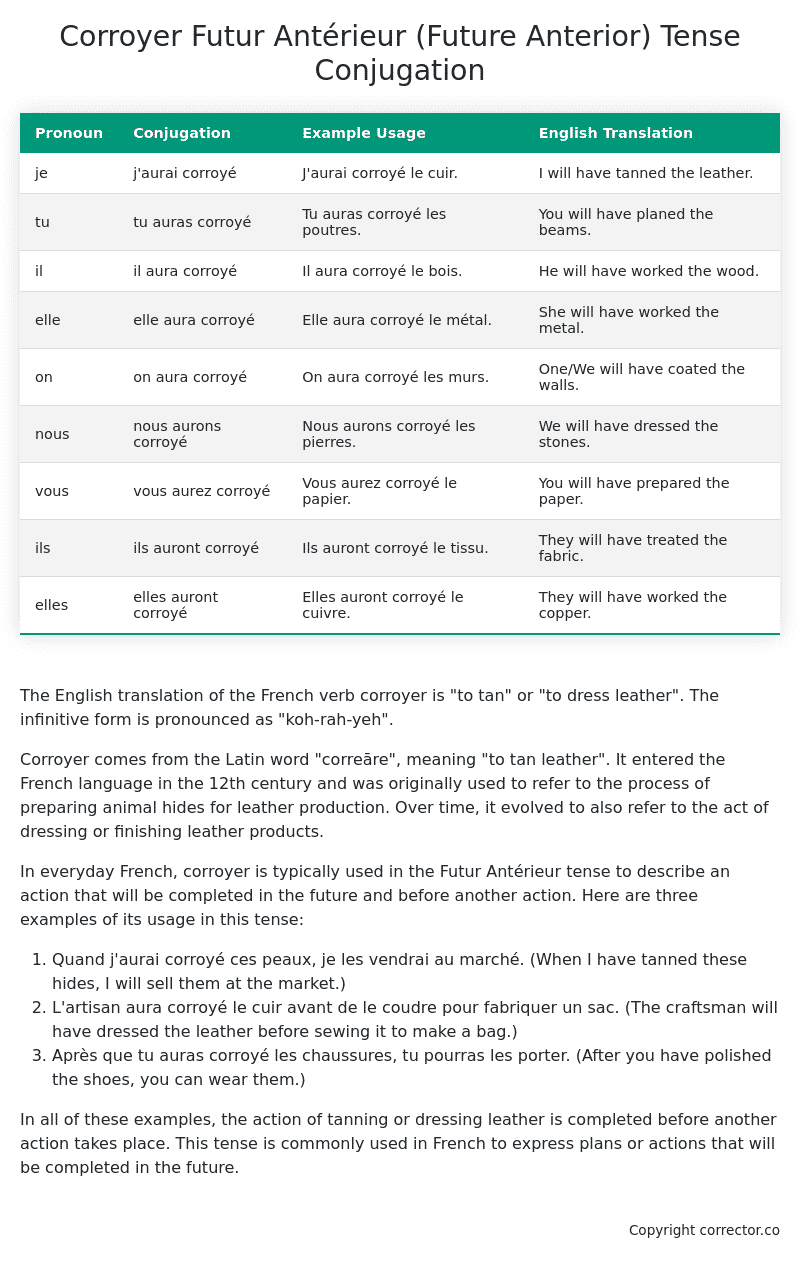Futur Antérieur (Future Anterior) Tense Conjugation of the French Verb corroyer
Introduction to the verb corroyer
The English translation of the French verb corroyer is “to tan” or “to dress leather”. The infinitive form is pronounced as “koh-rah-yeh”.
Corroyer comes from the Latin word “correāre”, meaning “to tan leather”. It entered the French language in the 12th century and was originally used to refer to the process of preparing animal hides for leather production. Over time, it evolved to also refer to the act of dressing or finishing leather products.
In everyday French, corroyer is typically used in the Futur Antérieur tense to describe an action that will be completed in the future and before another action. Here are three examples of its usage in this tense:
- Quand j’aurai corroyé ces peaux, je les vendrai au marché. (When I have tanned these hides, I will sell them at the market.)
- L’artisan aura corroyé le cuir avant de le coudre pour fabriquer un sac. (The craftsman will have dressed the leather before sewing it to make a bag.)
- Après que tu auras corroyé les chaussures, tu pourras les porter. (After you have polished the shoes, you can wear them.)
In all of these examples, the action of tanning or dressing leather is completed before another action takes place. This tense is commonly used in French to express plans or actions that will be completed in the future.
Table of the Futur Antérieur (Future Anterior) Tense Conjugation of corroyer
| Pronoun | Conjugation | Example Usage | English Translation |
|---|---|---|---|
| je | j’aurai corroyé | J’aurai corroyé le cuir. | I will have tanned the leather. |
| tu | tu auras corroyé | Tu auras corroyé les poutres. | You will have planed the beams. |
| il | il aura corroyé | Il aura corroyé le bois. | He will have worked the wood. |
| elle | elle aura corroyé | Elle aura corroyé le métal. | She will have worked the metal. |
| on | on aura corroyé | On aura corroyé les murs. | One/We will have coated the walls. |
| nous | nous aurons corroyé | Nous aurons corroyé les pierres. | We will have dressed the stones. |
| vous | vous aurez corroyé | Vous aurez corroyé le papier. | You will have prepared the paper. |
| ils | ils auront corroyé | Ils auront corroyé le tissu. | They will have treated the fabric. |
| elles | elles auront corroyé | Elles auront corroyé le cuivre. | They will have worked the copper. |
Other Conjugations for Corroyer.
Le Present (Present Tense) Conjugation of the French Verb corroyer
Imparfait (Imperfect) Tense Conjugation of the French Verb corroyer
Passé Simple (Simple Past) Tense Conjugation of the French Verb corroyer
Passé Composé (Present Perfect) Tense Conjugation of the French Verb corroyer
Futur Simple (Simple Future) Tense Conjugation of the French Verb corroyer
Futur Proche (Near Future) Tense Conjugation of the French Verb corroyer
Plus-que-parfait (Pluperfect) Tense Conjugation of the French Verb corroyer
Passé Antérieur (Past Anterior) Tense Conjugation of the French Verb corroyer
Futur Antérieur (Future Anterior) Tense Conjugation of the French Verb corroyer (this article)
Subjonctif Présent (Subjunctive Present) Tense Conjugation of the French Verb corroyer
Subjonctif Passé (Subjunctive Past) Tense Conjugation of the French Verb corroyer
Subjonctif Imparfait (Subjunctive Imperfect) Tense Conjugation of the French Verb corroyer
Subjonctif Plus-que-parfait (Subjunctive Pluperfect) Tense Conjugation of the French Verb corroyer
Conditionnel Présent (Conditional Present) Tense Conjugation of the French Verb corroyer
Conditionnel Passé (Conditional Past) Tense Conjugation of the French Verb corroyer
L’impératif Présent (Imperative Present) Tense Conjugation of the French Verb corroyer
L’infinitif Présent (Infinitive Present) Tense Conjugation of the French Verb corroyer
Struggling with French verbs or the language in general? Why not use our free French Grammar Checker – no registration required!
Get a FREE Download Study Sheet of this Conjugation 🔥
Simply right click the image below, click “save image” and get your free reference for the corroyer Futur Antérieur tense conjugation!

Corroyer – About the French Futur Antérieur (Future Anterior) Tense
Construction
Common Everyday Usage Patterns
Interactions with Other Tenses
For example
Summary
I hope you enjoyed this article on the verb corroyer. Still in a learning mood? Check out another TOTALLY random French verb conjugation!


